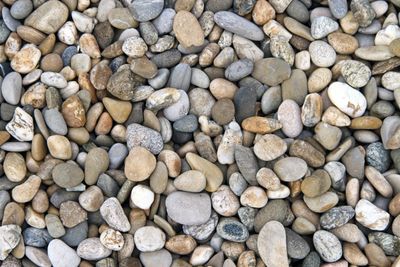Landscaping with Rocks and Pebbles
When we hear the word “mulch,” we oftentimes think of wood chips, straw, or composts. However, landscape rocks are also generally described as mulch. Just like organic mulching materials, rock and pebble mulches have their pros and cons in the landscape. While excellent at controlling erosion, rock mulches do not help retain moisture in the soil like organic mulches. In fact, rock mulches tend to heat up quite a bit in the sun, causing the soil beneath them to be hot and dry. They also reflect sunlight up at plants, causing excessive transpiration and drying out. Because of this heat, dryness, and dense coverage, rock mulches do work well to suppress weeds. Over time, organic mulches break down and decay in the landscape bed. As they do this, they add valuable nutrients to the soil that benefit the plants. Unfortunately, this breakdown means organic mulches must be reapplied and topped up every year or two. Rock mulches do not break down and don’t need constant reapplication. But they also do not add any nutrients to the soil. While the initial cost to fill landscape beds with rock mulch can be very costly, the rock lasts much longer, saving you money in the long run. Another benefit to rock mulch vs. organic mulch is that beds mulched with rock do not provide hiding spots and adequate breeding grounds for many pests and diseases like organic mulches do. Another drawback to rock mulch, though, is that it is hard to plant new plants in and is pretty much permanent once it has been laid.
River Rock Mulch Landscape Ideas
River pebble mulch is harvested from riverbeds. It is one of the most common varieties of rock mulches and can be found by various names like river rock or Mississippi stone. Most garden centers or landscape supply stores will have river rock available in different sizes, from small pebbles to large chunks. Unlike granites or lava rock, river pebble mulch is comprised of smooth stones in natural tones of tan, gray, etc. They may not have the bold color or texture of some other rock mulches, but they are excellent for natural-looking beds. Using river rock mulch is probably not a good idea for your annual beds or vegetable garden, as it is very hard to plant in several inches (7.5 cm.) of stone. It is fine to use in permanently planted beds, like rings around large trees or other areas where you plan to just plant once and be done with it. Because they are not flammable like some organic mulches, rock mulches are excellent for use around fire pits or grills. Landscaping around pools or ponds with river rock mulch can also keep the area tidy and dry. Ideally, due to its lack of moisture retention, rock mulches are best when used with drought-tolerant or rock garden plants.
